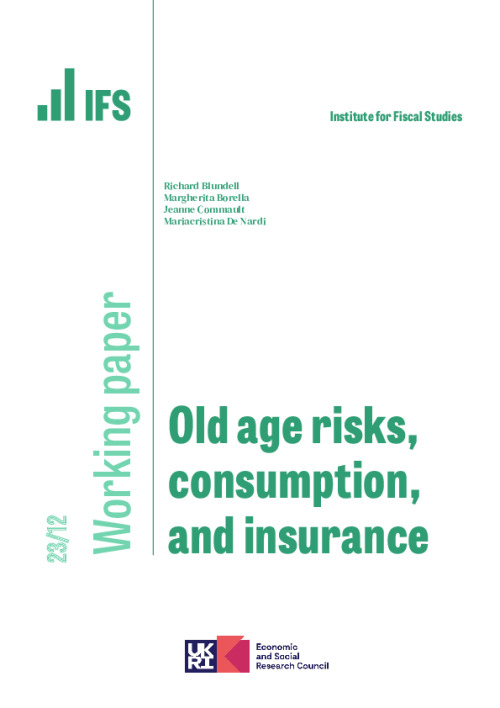Downloads

WP202312-Old-age-risks-consumption-and-insurance.pdf
PDF | 768.38 KB
In the U.S, after age 65, households face income and health risks and a large fraction of these risks are transitory. While consumption significantly responds to transitory income shocks, out-of-pocket medical expenses do not. In contrast, both consumption and out-of-pocket medical expenses respond to transitory health shocks. Thus, most U.S. elderly keep their out-of-pocket medical expenses close to a satiation point that varies with health. Consumption responds to health shocks mostly because adverse health shocks reduce the marginal utility of consumption. The effect of health on marginal utility changes the optimal transfers due to health shocks.
Authors

CPP Co-Director
Richard is Co-Director of the Centre for the Microeconomic Analysis of Public Policy (CPP) and Senior Research Fellow at IFS.

Research Associate University of Torino
Margherita is a Research Associate and an Associate Professor at the University of Torino.

Research Fellow University of Minnesota and Federal Reserve Bank of Minneapolis
Mariacristina is an Research Fellow at the IFS and also a Professor in the Economics Department at the University of Minnesota.
Assistant Professor of Economics Sciences Po
Working Paper details
- DOI
- 10.1920/wp.ifs.2023.1223
- Publisher
- Institute for Fiscal Studies
Suggested citation
Blundell, R et al. (2023). Old age risks, consumption, and insurance. 23/12. London: Institute for Fiscal Studies. Available at: https://ifs.org.uk/publications/old-age-risks-consumption-and-insurance (accessed: 30 June 2024).
More from IFS
Understand this issue

If you can’t see it, you can’t be it: role models influence female junior doctors’ choice of medical specialty
24 April 2024

Liberal Democrat manifesto: a reaction
10 June 2024

The NHS waiting list: when will it come down?
29 February 2024
Policy analysis

How do the last five years measure up on levelling up?
19 June 2024

The Conservatives and the Economy, 2010–24
3 June 2024

A decade and a half of historically poor growth has taken its toll
3 June 2024
Academic research

The impact of labour demand shocks when occupational labour supplies are heterogeneous
28 June 2024

The role of hospital networks in individual mortality
13 May 2024

Forced displacement, mental health, and child development: Evidence from Rohingya refugees
10 May 2024